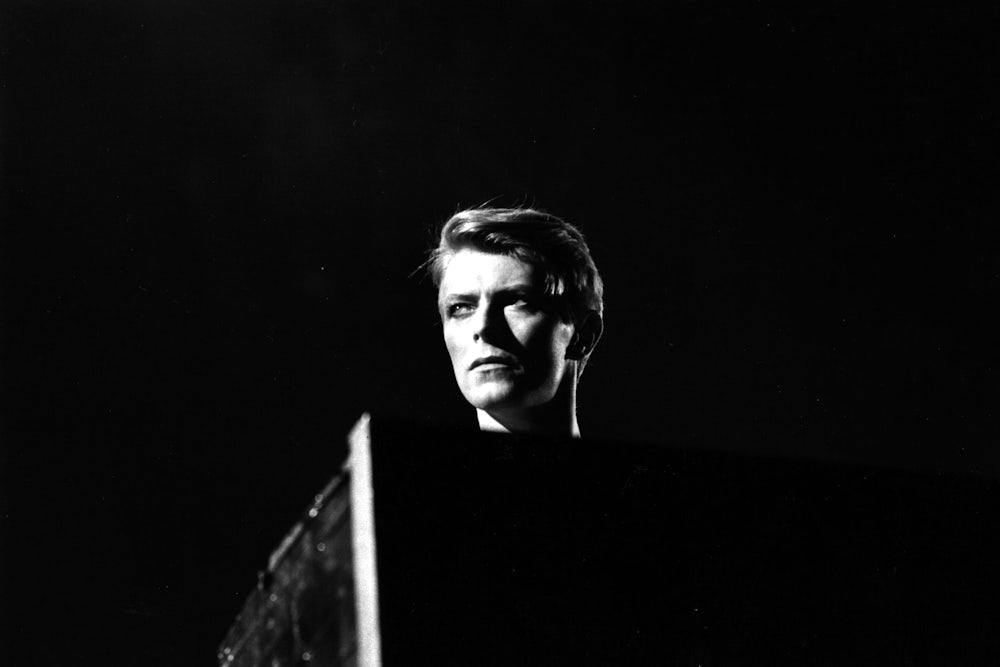After Andy Warhol had been shot by Valerie Solanas in 1968, he said, “Before I was shot, I suspected that instead of living I’m just watching TV. Since being shot, I’m certain of it.” Bowie’s acute ten-word commentary on Warhol’s statement, in the eponymous song from Hunky Dory in 1971, is deadly accurate: “Andy Warhol, silver screen / Can’t tell them apart at all.” The ironic self-awareness of the artist and their audience can only be that of their inauthenticity, repeated at increasingly conscious levels. Bowie repeatedly mobilizes this Warholian aesthetic.
The inability to distinguish Andy Warhol from the silver screen morphs into Bowie’s continual sense of himself being stuck inside his own movie. Such is the conceit of “Life on Mars?,” which begins with the “girl with the mousy hair,” who is “hooked to the silver screen.” But in the final verse, the movie’s screenwriter is revealed as Bowie himself or his persona, although we can’t tell them apart at all:
But the film is a saddening bore
’Cause I wrote it ten times or more
It’s about to be writ again.
The conflation of life with a movie conspires with the trope of repetition to evoke a melancholic sense of being both bored and trapped. One becomes an actor in one’s own movie. This is my sense of Bowie’s much-misunderstood lines in “Quicksand”:
I’m living in a silent film
Portraying Himmler’s sacred realm
Of dream reality.
Bowie displays an acute awareness of Himmler’s understanding of National Socialism as political artifice, as an artistic and especially architectural construction, as well as a cinematic spectacle. Hitler, in the words of Hans-Jürgen Syberberg, was ein Film aus Deutschland, a film from Germany. As Bowie put it, Hitler was the first pop star. But being stuck inside a movie evokes not elation but depression and a Major Tom–like inaction:
I’m sinking in the quicksand of my thought
And I ain’t got the power anymore.
In “Five Years,” after having received the news that the Earth will soon die, Bowie sings, “And it was cold and it rained and I felt like an actor.” Similarly, in one of my all-time favorite Bowie songs, “The Secret Life of Arabia” (outrageously and ferociously covered by the late, great Billy Mackenzie with the British Electric Foundation), Bowie sings,
You must see the movie
The sand in my eyes
I walk though a desert song
When the heroine dies.
The world is a film set, and the movie that’s being shot might well be called Melancholia. One of Bowie’s best and bleakest songs, “Candidate,” begins with a statement of explicit pretense, “We’ll pretend we’re walking home,” and is followed by the line, “My set is amazing, it even smells like a street.”
Art’s filthy lesson is inauthenticity all the way down, a series of repetitions and reenactments: fakes that strip away the illusion of reality in which we live and confront us with the reality of illusion. Bowie’s world is like a dystopian version of The Truman Show, the sick place of the world that is forcefully expressed in the ruined, violent cityscapes of “Aladdin Sane” and “Diamond Dogs” and, more subtly, in the desolate soundscapes of “Warszawa” and “Neuköln.” To borrow Iggy Pop’s idiom from Lust for Life (itself borrowed from Antonioni’s 1975 movie, although Bowie might well be its implicit referent), Bowie is the passenger who rides through the city’s ripped backside, under a bright and hollow sky.
